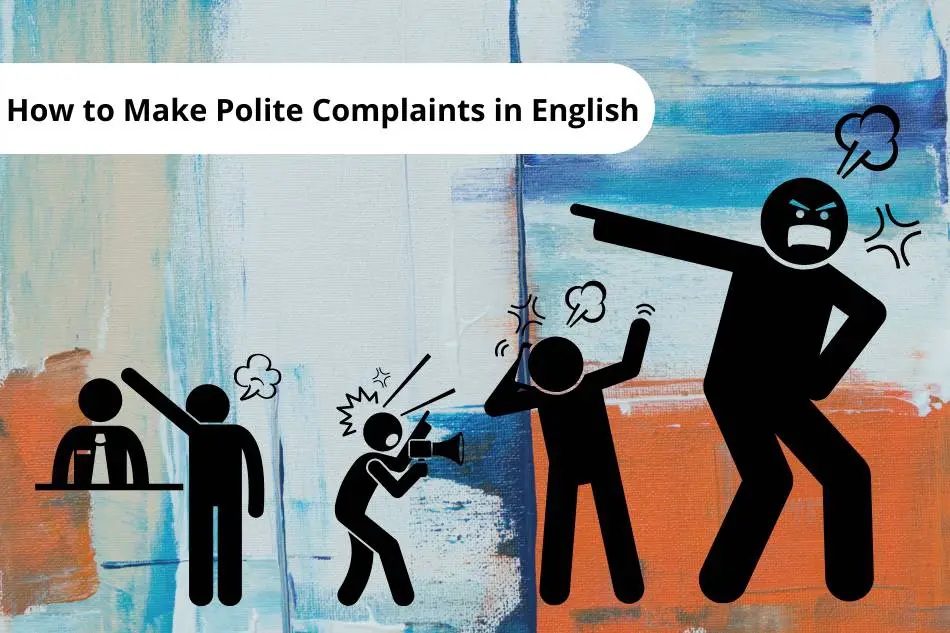Whenever we are not satisfied with something, we complain to communicate the problem. Though complaining is quite common in our everyday lives, you will hardly find someone comfortable listening to complaints. However, if you can complain politely, people may find it acceptable.
Are you wondering how to do it? No worries! In this post, I’ll share some expressions and tips that you can use to make polite complaints in English.
As a general rule, to complain, you can say, “I would like to complain…” or “I am sorry to complain about….” The right choice of words, polite tone, and body language are the key to making polite complaints. Also, complaining in a way that sounds like you are giving an opinion or requesting a solution can help you complain without sounding rude.
While complaining, rather than being so direct, you can complain in a way that seems you are giving and asking for an opinion. Rather than complaining, you should make requests to solve the problem. In many cases, you may want to sound like you ask for permission to talk about the issue instead of complaining.
Are you looking for a book or a guide to help you learn and improve your English? You may try English Made Easy Volume One: A New ESL Approach: Learning English Through Pictures (Amazon Link).
Here is a list of expressions to make polite complaints. Later, in the post, I will discuss some expressions in detail and give some tips on making polite complaints.
I Would Like to…

“I would like to…” is one of the most common ways to make complaints. Though it sounds direct, having the modal verb “Would” in the expression makes it polite. Here are some variations of using this expression.
- I would like to complain about the toy I bought from your store yesterday.
- I would like to make a complaint about the water supply in the apartment.
- I would like to talk about the toy I bought from your store yesterday.
- I would like to share a problem with the toy I bought from your store yesterday.
- I would like to bring up the issues about the delivery process.
I’m Sorry to…
While complaining, you can show that you feel sorry for complaining. But as the problem is unavoidable, that’s why you are complaining. “I’m sorry to…” is one of the very effective ways to do so. Let’s see some examples:
- I’m sorry to complain about the service of your restaurant.
- I’m sorry to bring the issue of your service into discussion again.
- I’m sorry to talk about the problems with your products.
- I’m sorry to share the problems I found with the goods.
- I’m sorry to have to say this, but I received a defective pair of shoes.
Excuse Me, But I’m…
“Excuse Me, But I’m” serves a similar purpose as “I’m sorry to…” does. You use this expression when you feel like not complaining but are bound to. Here are some examples:
- Excuse me, but I’m not happy with your service.
- Excuse me, but I received better products as samples.
- Excuse me, but I’m disappointed about the quality.
I Regret to Bother You… or I’m Sad/Regretful to Bother You…
“I regret to bother you…” is a very polite expression that you can use to make polite complaints. Here is the use of this expression in sentences.
- I regret to bother you by complaining about your behavior yesterday.
- I’m sad to bother you by discussing the problems in the event again.
- I’m regretful to bother you talking about the quality issues.
May I Share/Talk/Discus…

Starting a sentence with a modal verb usually sounds polite. While complaining, if you start with “May I…” it will sound like you are asking for permission which may impress the person you are complaining to. If it happens like this, s/he may not feel offended or disgusted. Examples of such expressions are.
- May I share the problems with your goods with you?
- May I talk about the issues I faced with the software?
- May I discuss the faulty items?
I Think There Was a Misunderstanding/Confusion/Mix-up…
While complaining, if you acknowledge that there was a communication gap, that’s why the problem occurs; it eases the problem. In this way, you don’t sound like you are blaming anyone; instead, you are more concerned about the solution. “I think there was a misunderstanding…” is a very polite and effective way to make polite complaints in English.
- I think there was a misunderstanding about the quantity.
- I think there was confusion regarding the size of the dresses.
- I think there was a mix-up in the communication.
I Know/Believe/Understand… or I’m Sure…

“I know…” is similar to the previous expression. This is also effective as “I think there was a confusion/mix-up….”
- I know it was not your fault, but I would like to request compensation.
- I know you are not solely responsible, but you should find a solution.
- I’m sure it was not your fault; thus we need to discuss a solution.
- I understand you didn’t do it intentionally, but still, you can suggest a solution.
10 Tips on How to Make Polite Complaints in English
- Before complaining, be 100% sure that you have a valid reason to complain. Don’t complain just for the sake of complaining.
- Be very specific and clear about the problem you complain about. Show reasons why you are complaining.
- No matter how angry you are about the issue you want to complain about, be polite. Politeness is the key to a good conversation. You might be angry, but you must know how to express anger politely.
- To avoid rudeness, you can give your opinion about the problem and ask for an opinion from the person you are complaining to. Remember! No one likes to listen to complaints.
- The best way to complain is to turn a complaint into a request to solve the problem.
- Rather than being too direct, you can sound like you are asking for permission to talk about the problem you faced.
- Be sensitive about people’s feelings. Be sure that your complaint doesn’t hurt someone. Rather than blaming someone, explain the problem you are facing and express your feelings.
- Don’t complain about any problem that no one can solve. It will be just a waste of time. Move forward and be careful that the same problem never happens again.
- Maintain a polite tone and body language while complaining. Only polite words may not make your complaint polite unless your tone and body language are polite.
- Try to avoid complaints if you can cope with this or can solve the problem by yourself.
In Conclusion
Politeness is always the key to a good conversation. Whether you make a complaint or a request, or ask or give opinions, or ask for permission or give orders or instructions, you should be polite in your choice of words, tone, and body language.
I hope this post will help you better understand how to complain in English.
Thanks for reading!
Keep practicing.
Happy learning English!
Related posts:





